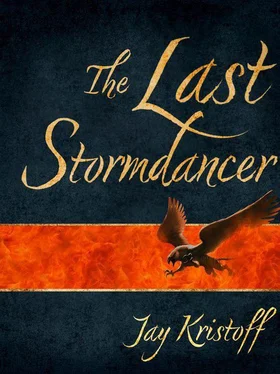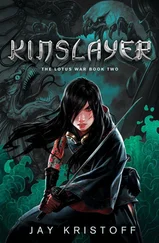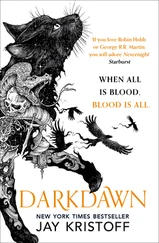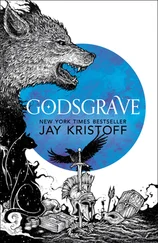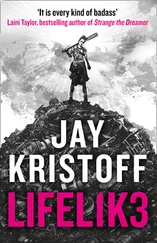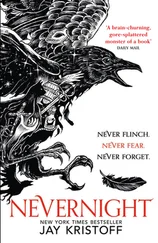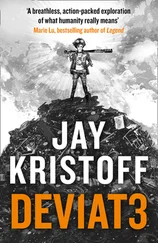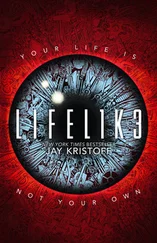“I ask forgiveness if this displeases,” Lady Ami continued. “But if the only proof—”
Jun grasped his walking stick in both hands. With a click and a flourish, he drew his fists apart, revealing the three feet of gleaming folded steel hidden inside the haft.
“Master Jun—” the Lady warned, a tremor in her voice.
Jun leaped across the tea service, sending the pot and cups crashing to the floor. Lady Ami rose to her feet and shrank back in sudden fright, clutching the small tantō blade hidden in the drum bow at her waist. The guards about the room cried out in alarm at the sight of Jun’s hidden blade, raising their tasseled spears and charging toward the blind boy, intent on protecting their mistress.
As such, they missed the assassins crawling in the rafters above.
A shuddering pop! pop! pop! pop! rang out overhead, the air filled with dozens upon dozens of gleaming shuriken stars. The guards fell, bloody and screaming, the whistling blades shearing through skin and leather, puncturing iron breastplates. Lady Ami cursed as Jun pushed her back against a pillar, swiping at the air with his thin sword. Sparks flew, blinding bursts of light, the boy moving as a field of long grass in a rolling winter wind. His blade struck the shuriken from the air, one, two, three, head tilted, eyes closed, brow furrowed, pain twisting his features as one of the stars struck his arm, another grazed his cheek. Blood flowing now, bright and red, and still he moved amidst the hail, sweeping his blade as if a conductor’s baton, and the gleaming death sprayed toward him, his orchestra.
A series of hollow clicks and the room fell silent, save for the Lady’s shuddering breath, the moans of dying guards. And from the ceiling, long, thin-limbed shapes unfurled—men, clad in shadows, strange weapons with flat barrels in their hands. Loose black cloth swathing their forms, a strip of flesh showing through their cowls, eyes covered in goggles of dark red glass.
They sheathed their hollow weapons at their waists, drew long katana from their backs, the blades studded with spinning, growling teeth. Jun frowned, the engines’ growls filling his ears, clouding the assassins’ footsteps as they crept closer. He felt the Lady Ami at his back, heard her draw her own blade, ragged breath, steel in her voice.
“There are eight of them,” she whispered.
“I know.” A slow nod. “Can you use that tantō you carry?”
“I am no master like you, Jun-san,” Ami breathed. “Should we live through this, I would hear the telling of how a blind painter became a sword-saint…”
“Stay behind me, then. I will protect you with my life.”
Soft footsteps as the figures gathered about them. The Lady’s voice, softer still.
“My thanks, Jun-san.”
“No thanks necessary,” the boy smiled. “I am in no danger.”
“There is a fine line between confidence and arrogance, young master.”
“Not arrogance, Lady. I simply cannot die today.”
He flashed her a winning grin.
“I have not saved the world yet.”
The assassins closed, growling swords raised high in their hands. Were this some pantomime or puppet show on the streets of your scabs, monkey-child, the assailants would have come one at a time, neat and orderly, to be impaled in proper fashion upon the young and dashing hero’s blade to the hymn of the cheering crowd. And it is true that, for some astonishing reason, the first two murderers did approach in a rather conventional array, one slightly behind the other, perhaps lulled into false confidence by the milk-white orbs behind the boy’s lashes.
Jun side-stepped a scything, downward blow, the same hummingbird speed he had used to shame me before my kin serving him now in an arena just as deadly. He leaned in close, below another sweeping strike, and with a bright note of razored steel and the sharp clipped intake of his assailant’s breath, he pushed his blade in and out of the assassin’s chest, one, twice, spinning on the spot and planting his boot square in his foe’s belly.
The bleeding, punctured lump of carrion flew back into his comrades, scattering them long enough for Jun to swipe his blade across the second assassin’s throat. Bright arterial spray painted the boy’s face crimson, the Lady Ami gritting her teeth to stifle her gasp of horror. And then all became chaos, no form or order to it, just six snarling blades filling the air. Jun pushing Lady Ami back, ducking below one strike, leaping up onto the pillar and springing away to dodge the next four. Hurling his scabbard into one assassin’s face, divesting another of his hamstrings. The sting of burning exhaust in his nostrils, choking his lungs. The chainkatana growl utterly stifling his sense of hearing, leaving him secretly thanking the gods for the two cats who even now lingered at the room’s periphery, bubbling with vague concern over the fate of their mistress.
It was through their eyes he saw.
But it was to my mind he called.
I had become bored, and more than a little disgruntled, I will confess. Sitting beneath the thin shade of a struggling sugi tree and snarling whenever one of the terrified serving staff looked my way. I had been seriously considering taking to the skies to escape the gut-churning stink when I heard the boy’s cry of alarm in my mind, raising the hackles on my back, the threat he felt somehow spilling over into me and setting my skin to bristling.
Friend Koh! Help us!
I cannot explain the sensation. Your tongue is crude and shapeless, monkey-child, and your words have brittle meaning. I can only say that, though I knew the voice to be his, somehow I felt the threat to be mine. That I stood there, in the room with him, the vague weight of his blade in my hands. Perhaps it was the time he had spent in my eyes? Perhaps the soft kinship we shared, both orphans, both outcasts, both alone? I could not say then, and now, it fills me to sadness to dwell in those thoughts. So instead of the why, I will speak of the what.
The doors of the monkey-nest burst apart like glass beneath my weight, and I pounded down the corridors, shredding the floorboards to splinters as I came. There was no sky over my head, no sun or moon on my back, and the wrongness of this place struck me to my heart. Stone and clay and twigs, vast boxes filled with stink and pretty, pointless trinkets. But on I ran, great loping strides, wings crackling with fresh lightning. Through another set of doors, smashing a wall to dust and ruin, closing in on his thoughts like moth approaches candleflame. Through another wall and at last to him—the little blind boy and the painted monkey-girl, their backs to a pillar of stone, surrounded on all sides by men in thin and gleaming black, slivers of growling steel in their hands.
I roared, bellowed, thundered, pounding the boards with my feet and the air with my wings. A great sonic boom birthed at my feathertips, splitting the floor asunder, blasting three of the assassins to mush and guts as they turned to face me. And herein lies the strangest thing—the sensation in which your words most dismally fail. For as we fought, the boy and I, as I stepped up beside him and cleaved the black-clad men to ribbons, just as he furnished them with a bevy of new and weeping holes, I lost all sense of myself. Not to say I was stricken with some red rage blinding me to the battle’s flow, no. Simply to say I somehow lost track of where I concluded and where we commenced. I could feel him in my mind. Behind my eyes. Flowing with me and through me. And as we moved, I thought perhaps I knew why the old tales called those who rode the backs of my kin Stormdancers. For that, it seemed, was the closest word you have to describe what we did in the midst of that song of screams and blades and blood.
Читать дальше
